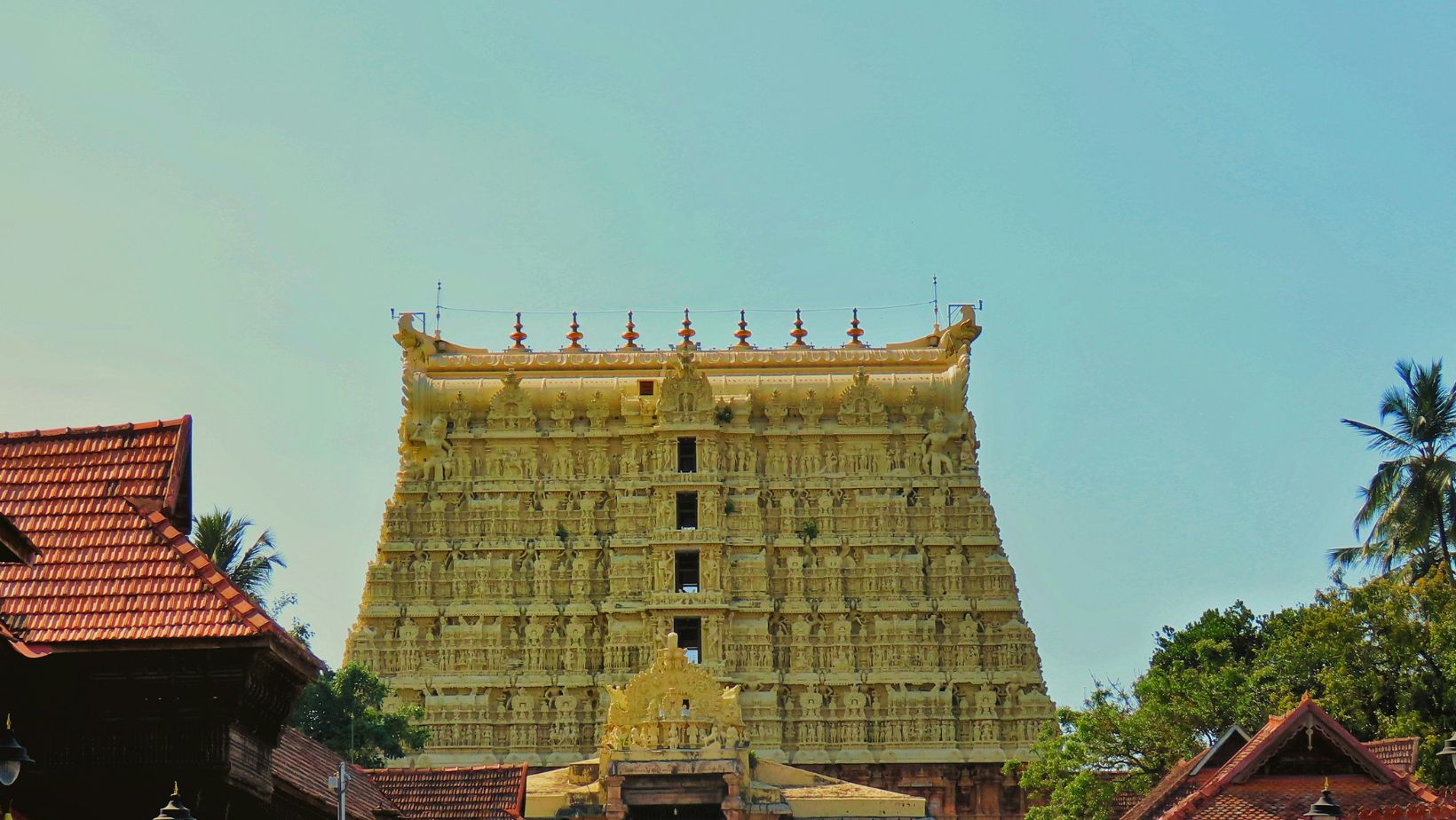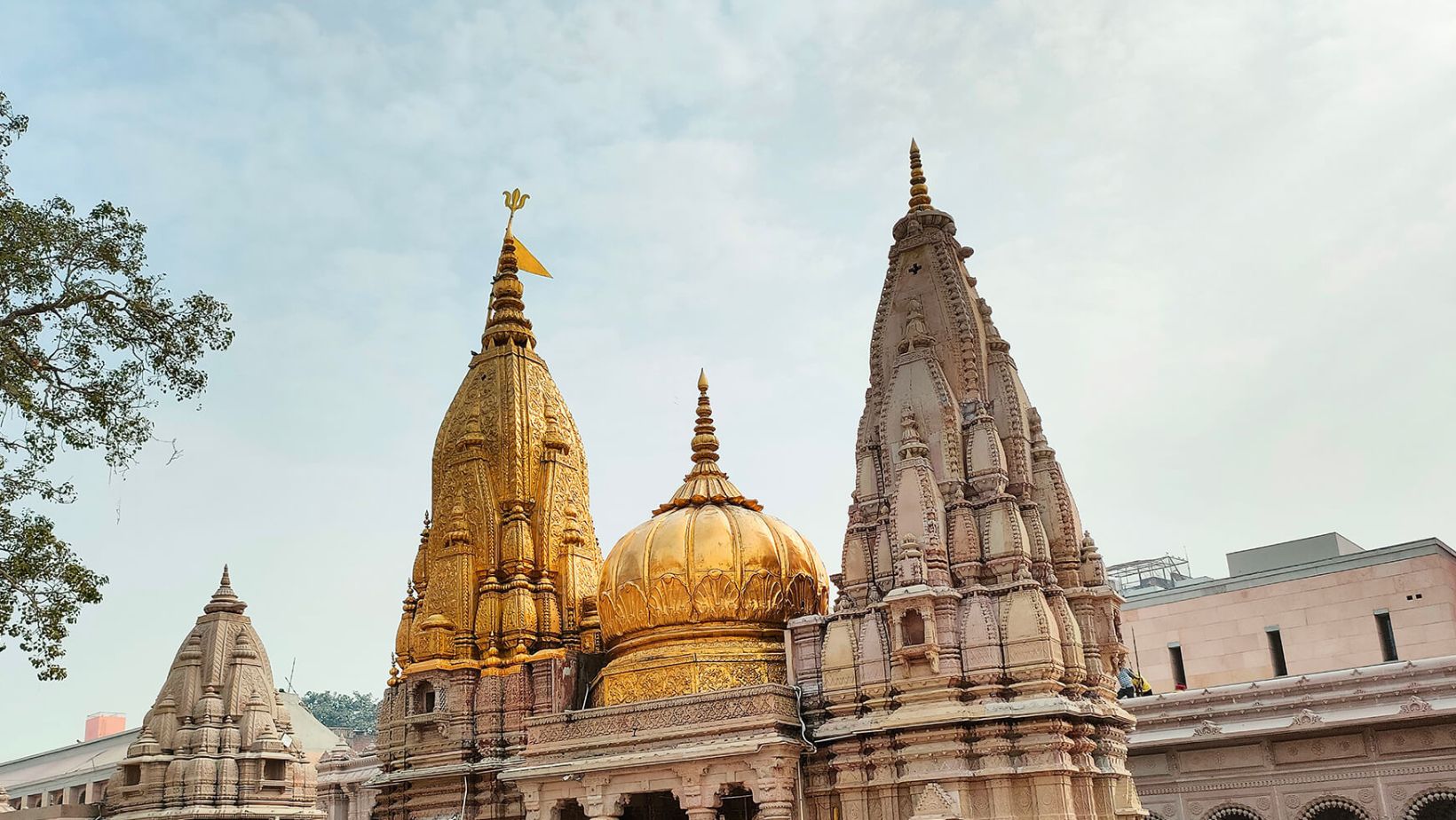Sree Padmanabhaswamy Temple stands proudly in Thiruvananthapuram, Kerala’s vibrant capital. Dedicated to Lord Vishnu, this temple showcases splendid Dravidian architecture. With its historical significance, the temple attracts devotees and tourists worldwide. Ancient texts like the Brahmanda Purana mention the temple’s sacredness. Additionally, the structure intertwines mythology, history, and architecture, making it unique among India’s temples.
Historical Background
Origin and Early History
Legends state sage Divakara founded the temple centuries ago. The temple honors Lord Vishnu reclining on Anantha, a sacred serpent. Thiruvananthapuram derives its name from “Thiru-Anantha-Puram,” meaning the city of Lord Anantha. Historical records indicate renovations occurred during various periods, enhancing its architecture and facilities.
Royal Patronage
The Travancore royal family maintained a close bond with the temple, contributing significantly to its growth. Marthanda Varma, the 18th-century ruler, renovated and expanded the temple extensively. He dedicated his kingdom to Lord Padmanabha, symbolically ruling as the deity’s servant. Successive monarchs upheld this tradition, strengthening ties between the temple and royalty.
Architectural Splendor
Dravidian Architecture
Sree Padmanabhaswamy Temple exemplifies traditional Dravidian architecture, characterized by ornate carvings, massive gopurams, and intricate sculptures. Its impressive seven-tier gopuram, reaching a height of 100 feet, welcomes visitors with grandeur. Skilled artisans adorned its walls with vivid portrayals of mythological scenes, deities, and celestial beings.
Main Shrine
Garbhagriha
The sanctum sanctorum or garbhagriha houses the magnificent idol of Lord Padmanabha reclining on serpent Anantha. Carved from a rare amalgamation of 12,008 sacred saligrams, the idol symbolizes divine energy. This reclining posture signifies Lord Vishnu’s cosmic rest, nurturing creation.
Idol Significance
The deity measures approximately 18 feet, visible through three doors symbolizing creation, preservation, and destruction. The right hand extends over a Shiva lingam, signifying harmony between Vishnu and Shiva. Devotees regard this idol as powerful, seeking blessings for prosperity and protection.
Mandapams and Corridors
Magnificent pillared halls, known as mandapams, enhance the temple’s beauty. The spacious corridors surrounding the sanctum facilitate circumambulation and meditation. Sculptures depicting epic tales from the Ramayana and Mahabharata adorn these pillars, narrating stories visually to pilgrims.
Religious Significance
Pilgrimage Importance
Sree Padmanabhaswamy Temple ranks among India’s foremost pilgrimage destinations. Believers assert that a visit grants spiritual merit, peace, and salvation. Pilgrims from diverse regions visit year-round, fulfilling vows and participating in rituals to honor Lord Vishnu.
Rituals and Festivals
Daily Rituals
The temple adheres strictly to rituals prescribed in ancient scriptures. Priests perform daily worship (puja) meticulously, involving bathing, clothing, and adorning the deity with flowers. Offerings of food (naivedyam) prepared with precision follow these rituals.
Major Festivals
Significant festivals include Alpasi and Painkuni festivals, celebrated biannually with enthusiasm. The Lakshadeepam festival stands out, illuminating the temple with thousands of lamps, symbolizing divine presence. Additionally, Navaratri, Vishu, and Janmashtami draw huge crowds, enriching spiritual experiences.
Secret Vaults and Wealth
Discovery of Vaults
In 2011, during temple maintenance, authorities discovered hidden vaults beneath the temple, revealing unimaginable treasures. The Supreme Court ordered the opening of these vaults, uncovering gold ornaments, precious gems, antique jewelry, and valuable artifacts.
Wealth and Controversies
Estimates placed the value of discovered treasures at billions of dollars, making Sree Padmanabhaswamy Temple the richest globally. This discovery sparked widespread interest, attracting global media attention and tourists intrigued by its mysterious wealth. However, disputes arose regarding management and ownership, leading to legal interventions and governmental oversight.
Vault B Mystery
Vault B remains unopened, enveloped in superstition and myths. Legend states opening it without proper rituals could unleash disasters. Scholars and priests warn of dire consequences, enhancing intrigue surrounding this vault.
Cultural Influence
Literary References
Ancient texts, literature, and poetry frequently reference Padmanabhaswamy Temple, highlighting its cultural prominence. Malayalam poets like Kumaran Asan and Ulloor praised the temple, enriching Kerala’s literary heritage. Numerous hymns composed in devotion to Lord Padmanabha reflect deep spiritual admiration.
Artistic Influence
The temple has inspired countless artists, dancers, and musicians. Classical dance performances like Kathakali and Mohiniyattam often depict stories centered around Lord Vishnu and Sree Padmanabhaswamy Temple. Artists draw inspiration from the temple’s architecture, mythology, and spiritual essence, enhancing Kerala’s artistic traditions.
Tourism and Accessibility
Tourist Attraction
Tourists worldwide visit Thiruvananthapuram specifically to experience Padmanabhaswamy Temple’s historical and architectural grandeur. Guided tours educate visitors about the temple’s history, mythology, and unique traditions. Photography restrictions ensure respect for religious sentiments and sacred spaces.
Visitor Guidelines
The temple follows strict guidelines regarding dress codes and conduct. Visitors must wear traditional attire, with men wearing dhotis and women wearing sarees or salwar suits. Non-Hindus cannot enter the inner sanctum but can explore other areas and admire the temple’s exterior architecture.
Accessibility and Facilities
Located centrally in Thiruvananthapuram, the temple remains easily accessible by road, rail, and air. Thiruvananthapuram International Airport lies within proximity, facilitating easy access for international visitors. The city provides numerous accommodation options catering to diverse preferences and budgets.
Preservation Efforts
Conservation Initiatives
Efforts to preserve the temple’s architecture and artifacts remain ongoing. Archaeological Survey of India (ASI) and state authorities coordinate preservation initiatives to protect the temple’s heritage. Regular maintenance, restoration, and careful monitoring ensure its longevity for future generations.
Security Enhancements
Post-vault discoveries, security has been significantly enhanced to protect valuable treasures. Surveillance systems, armed security personnel, and stringent entry protocols ensure the temple’s safety. These measures help maintain sanctity and discourage unauthorized access.
Sree Padmanabhaswamy Temple epitomizes Kerala’s rich cultural heritage, religious devotion, and architectural magnificence. Its historical wealth, intricate design, and profound spiritual importance attract pilgrims and tourists alike. Continued preservation efforts ensure that this sacred landmark endures, inspiring generations and retaining its revered status worldwide.











Keep on writing, great job!
Санобработка в Северной столицы! Квартиры, Особняки, Офисы. Экспертный уход по лояльным стоимости. Избавьтесь от хлопот! Напишите нам уборку сегодня! Заходите Клининговая Уборка Квартиры Цена
Наведение порядка в Санкт-Петербурге! Квартиры, Загородные резиденции, Офисные помещения. Экспертный клининг по приемлемым ценам. Позвольте себе расслабиться! Обратитесь к нам очистку сегодня! Переходите https://kliningovaya-uborka-spb.ru – Стоимость уборки квартиры после ремонта
Очищение в Городе на Неве! Квартиры, Коттеджи, Офисы. Надежный наведение порядка по конкурентным предложениям. Время для семьи и развлечений! Напишите нам клининг сию минуту! Перемещайтесь к https://uborka-top24.ru/
**mind vault**
mind vault is a premium cognitive support formula created for adults 45+. It’s thoughtfully designed to help maintain clear thinking
**breathe**
breathe is a plant-powered tincture crafted to promote lung performance and enhance your breathing quality.
Votre guide parifoot rdc: picks quotidiens, cotes comparees, tickets securises, gestion de mise, cash-out et promos. Depots via mobile money, retraits rapides, support francophone. LINAFOOT, CAF, ligues europeennes. Pariez avec moderation.